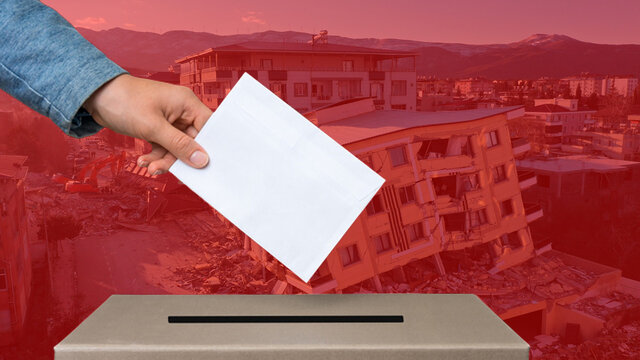In place of the initial (and still ongoing!) shock of the earthquake tragedy in Turkey and Syria, the first attempts are being made to understand its possible political consequences. Will the physical earthquake become political? After all, it happened just before the crucial elections in which the fate of Turkey, and possibly the entire region, will be decided once again.
Will this earthquake bury the political career of Turkish President Recep Tayyip Erdogan under its rubble, or will he once again, as he has done so many times before, be able to emerge victorious from difficult trials? There are many questions, and they are serious questions. But we have to start with the fact that there is still a considerable amount of time until May 14, the date on which the elections were postponed, during which anything can happen. And if we consider that the elections may be postponed at least until June 18, the date originally scheduled, but then moved to an earlier date, then even more so.
Unfortunately, this earthquake may not be the last in the foreseeable future for Turkey and other countries in the region. May Allah protect us from it, but it is clear that in the case of the expansion of the zone and the scale of such a disaster, there will be no talk of pre-election campaigns, debates and the like, because in such moments the question of the physical survival of millions of people arises.
Nevertheless, the reactions to what has happened that are already emerging at this moment are telling. And if we talk about what came from the Turkish opposition, it can be divided into two types. The first is a rational criticism of the government’s policies in the fields of construction, organization of rescue services and many other things. And although it is always easier to criticize than to act, such criticism is quite appropriate in any society, especially in a society based on democratic principles like Turkey.
But the second type is the openly disgraceful behavior of those, if we can call them that, who seemed to have faded into the background in recent times, but inevitably make themselves known in such moments. For example, Merdan Yanardag, the editor-in-chief of the radical Kemalist television channel TELE 1, attributed the cause of this earthquake to the religiousness of the inhabitants of the affected areas. “These are religious regions. They deliberately voted for these reactionary parties. The earthquake zone is a predominantly religious region. On what grounds could God punish them?” said the secular fanatic.
In other words, according to his logic, God punished people not for not believing in Him, or not for believing wrongly, but for believing too much? Absurd? But this is the secularist religion of people (or non-humans) who are willing to go to any lengths to justify their hatred of Islam and its followers. Just like another one of them, journalist Enver Aysever, who declared that the cause of the earthquake was “political Islam”. And this exposes a serious, systemic problem in Turkish political life that has been going on for years.
On the one hand, there is a fatigue with the current Turkish government, including some of its former supporters and even participants (Gül, Davutoğlu, Babacan, etc.), as well as with its obvious shortcomings and mistakes. And sometimes it seems that the correction of these mistakes is possible on the basis of a new consolidation of Turkish society on the basis of principles that unite the whole nation instead of pitting one part against another. And then, all of a sudden, in the ranks of the opposition, there are those who organize a campaign to ban religious associations and schools, and it immediately becomes clear – the old school Kemalists have not gone anywhere, they have simply gone into hiding. And some of them have accumulated so much malice that they are ready to wish death to their religious compatriots or justify their death on the basis of their religiosity.
And of course something has to be done about it. Because on the one hand, in a modern type of state that wants to see the majority of Turks within it regardless of their views, there must be opposition, political competition and the rotation of power.
On the other hand, if this opposition does not consolidate itself by distancing itself from those who incite hatred against the religious part of society and religious values, it will continue to be associated with the threat of revenge against the opponents of religion or even a civil war between the secular and religious camps of Turkish society.
And this can really lead to an earthquake not only in the Turkish political system, but also in the entire statehood, the number of victims of which can exceed the number of victims of the recent tragedy, as it happened during the war in Syria.
Therefore, the Turkish people can wish that the physical earthquake remains in the past and is not replaced by a political earthquake. And regardless of whether the existing government remains in power or a new one takes its place through elections, Turkish society remains united, especially in the face of such national tests, and the rights of its religious members are protected and inviolable.

